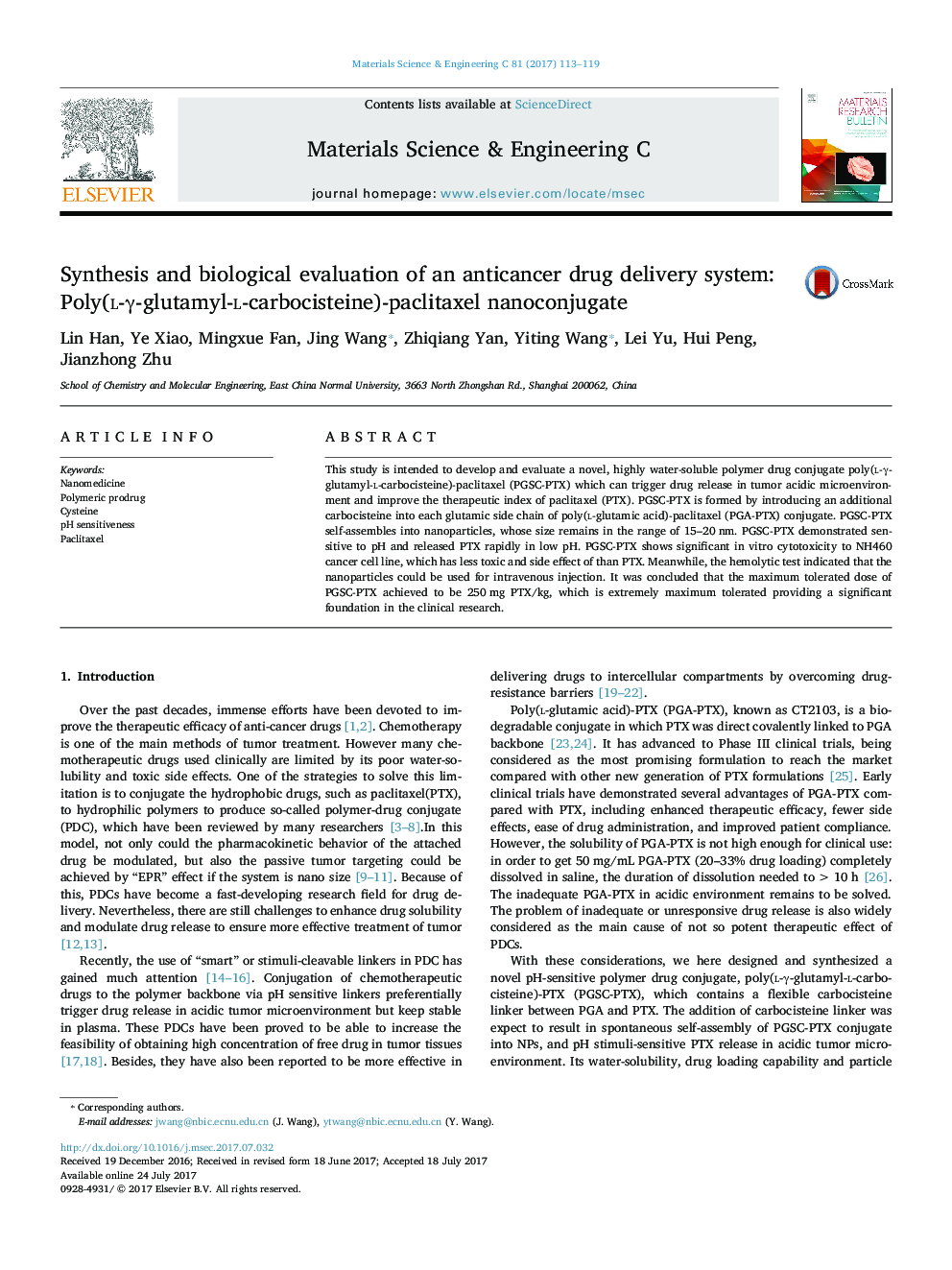| Article ID | Journal | Published Year | Pages | File Type |
|---|---|---|---|---|
| 5434219 | Materials Science and Engineering: C | 2017 | 7 Pages |
â¢PTX were successfully loaded on the framework of PGSC and formed a novel conjugate PGSC-PTX.â¢The size of PGSC-PTX remains in the range of 15-20 nm and its water solubility is 2000-fold higher than PTX.â¢PGSC-PTX demonstrated sensitive to pH and released PTX rapidly in acid pH.â¢The potency of PGSC-PTX was comparable to PGG-PTX conjugates against the human lung cancer NH460 cell line in vitro.â¢The maximum tolerated dose of PGSC-PTX was found to be 250 mg PTX/kg.
This study is intended to develop and evaluate a novel, highly water-soluble polymer drug conjugate poly(l-γ-glutamyl-l-carbocisteine)-paclitaxel (PGSC-PTX) which can trigger drug release in tumor acidic microenvironment and improve the therapeutic index of paclitaxel (PTX). PGSC-PTX is formed by introducing an additional carbocisteine into each glutamic side chain of poly(l-glutamic acid)-paclitaxel (PGA-PTX) conjugate. PGSC-PTX self-assembles into nanoparticles, whose size remains in the range of 15-20 nm. PGSC-PTX demonstrated sensitive to pH and released PTX rapidly in low pH. PGSC-PTX shows significant in vitro cytotoxicity to NH460 cancer cell line, which has less toxic and side effect of than PTX. Meanwhile, the hemolytic test indicated that the nanoparticles could be used for intravenous injection. It was concluded that the maximum tolerated dose of PGSC-PTX achieved to be 250 mg PTX/kg, which is extremely maximum tolerated providing a significant foundation in the clinical research.
Graphical abstractScheme 1 Synthesis procedure diagram of nano drug PGSC-PTX.The purpose of this study was to develop a novel, highly water-soluble Poly(l-γ-glutamyl-l-carbocisteine)-paclitaxel nanoconjugate (PGSC-PTX) that would improve the therapeutic index of paclitaxel (PTX), PTX were loaded on the framework of PGSC and formed a novel conjugate PGSC-PTX with 36% (w/w) loading capacity. PGSC-PTX self-assembles into nanoparticles, whose size remains in the range of 15-20 nm and its water solubility was 60 mg/mL, which is 2000-fold higher than PTX. PGSC-PTX demonstrated sensitive to pH and released PTX rapidly in acid pH. When tested in vitro against the human lung cancer NH460 cell line, the potency of PGSC-PTX was comparable to PGG-PTX conjugates. The IC50 for PGSC-PTX was almost equal to PGG-PTX. The maximum tolerated dose of PGSC-PTX was found to be 250 mg PTX/kg. (This result indicates that PGSC-PTX was substantially more effective in vivo than PGG-PTX.)Download high-res image (81KB)Download full-size image
